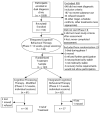Treatment Attendance Among Veterans With Depression, Substance Use Disorder, and Trauma
- PMID: 26828770
- PMCID: PMC4837955
- DOI: 10.1080/15504263.2016.1146384
Treatment Attendance Among Veterans With Depression, Substance Use Disorder, and Trauma
Abstract
Objective: Low attendance in psychotherapy, particularly among individuals with comorbid disorders, is a pervasive challenge. The present study examined predictors of treatment attendance in a sample of veterans with depression, substance use disorder, and trauma.
Methods: This is an analysis of data collected as part of a larger clinical trial involving outpatients at a Veterans Administration dual diagnosis clinic. Individuals were excluded if they had significant memory deficits, schizophrenia, bipolar disorder, or substantial travel constraints. Participants (N = 146) received 12 weeks of group-delivered integrated cognitive behavioral therapy for depression and substance use, followed by randomization to 12 additional weeks of individually delivered cognitive behavioral therapy (n = 62) or cognitive processing therapy (n = 61) modified to address substance use and trauma. Participants, therapists, and researchers were not blinded to group assignment. For this study, we included only the 123 participants who were randomized into the second phase, analyzing predictors of treatment attendance categorized into predisposing factors, enabling factors, and need factors.
Results: Participants were primarily male (89%) and Caucasian (76%) and averaged 47 years old (SD = 12). Forty-four percent had alcohol use disorder, 16% had drug use disorder, and 40% had polysubstance use disorder. Most met criteria for PTSD (82%), with 44% having combat-related trauma, 33% sexual trauma, and 28% other trauma. Treatment attendance did not differ between groups. More education was associated with increased group (r = .19, p = .04) and individual session attendance (r = .28, p = .002). Individuals with chronic housing problems attended fewer group sessions (r = -.19, p = .04), while individuals with sexual trauma, compared to those with other traumas, attended more individual sessions (r = .23, p = .01). Number of group sessions attended was positively associated with individual session attendance.
Conclusions: Few variables were significantly predictive of treatment attendance, possibly due to the complex nature of comorbid disorders. Including a focus on trauma was not associated with lower attendance. Special consideration may need to be given to education level, homelessness, and trauma when trying to engage and retain patients with comorbid disorders in treatment. This clinical trial is registered at www.clinicaltrials.gov as NCT00958217.
Keywords: Depression; PTSD; attendance; substance use; trauma; veterans.
Figures
Similar articles
-
Integrated Cognitive Behavioral Therapy Versus Cognitive Processing Therapy for Adults With Depression, Substance Use Disorder, and Trauma.J Subst Abuse Treat. 2016 Mar;62:38-48. doi: 10.1016/j.jsat.2015.11.005. Epub 2015 Nov 26. J Subst Abuse Treat. 2016. PMID: 26718130
-
Mediational relations between 12-Step attendance, depression and substance use in patients with comorbid substance dependence and major depression.Addiction. 2012 Nov;107(11):1974-83. doi: 10.1111/j.1360-0443.2012.03943.x. Epub 2012 Aug 10. Addiction. 2012. PMID: 22578037 Free PMC article. Clinical Trial.
-
A cognitive processing therapy-based treatment program for veterans diagnosed with co-occurring posttraumatic stress disorder and substance use disorder: The relationship between trauma-related cognitions and outcomes of a 6-week treatment program.J Anxiety Disord. 2018 Oct;59:34-41. doi: 10.1016/j.janxdis.2018.09.001. Epub 2018 Sep 15. J Anxiety Disord. 2018. PMID: 30248534
-
Psychological interventions for co-occurring depression and substance use disorders.Cochrane Database Syst Rev. 2019 Nov 26;2019(11):CD009501. doi: 10.1002/14651858.CD009501.pub2. Cochrane Database Syst Rev. 2019. PMID: 31769015 Free PMC article.
-
Interventions for adults with a history of complex traumatic events: the INCiTE mixed-methods systematic review.Health Technol Assess. 2020 Sep;24(43):1-312. doi: 10.3310/hta24430. Health Technol Assess. 2020. PMID: 32924926 Free PMC article.
Cited by
-
Predictors of therapeutic alliance, treatment feedback, and clinical outcomes among African American women in treatment for co-occurring PTSD and SUD.J Subst Abuse Treat. 2022 Aug;139:108766. doi: 10.1016/j.jsat.2022.108766. Epub 2022 Mar 22. J Subst Abuse Treat. 2022. PMID: 35346534 Free PMC article. Clinical Trial.
-
Latent class profile of psychiatric symptoms and treatment utilization in a sample of patients with co-occurring disorders.Braz J Psychiatry. 2017 Oct-Dec;39(4):286-292. doi: 10.1590/1516-4446-2016-1972. Epub 2017 Jan 9. Braz J Psychiatry. 2017. PMID: 28076648 Free PMC article.
-
Associations between violence, criminality, and cognitive control deficits among young men living in low resource communities in South Africa.Aggress Behav. 2020 Jan;46(1):5-15. doi: 10.1002/ab.21867. Epub 2019 Oct 14. Aggress Behav. 2020. PMID: 31612541 Free PMC article.
References
-
- Andersen RM. Revisiting the behavioral model and access to medical care: Does it matter? Journal of Health and Social Behavior. 1995;36(1):1–10. - PubMed
-
- Benedict RH, Schretlen D, Groninger L, Brandt J. Hopkins Verbal Learning Test–Revised: Normative data and analysis of inter-form and test-retest reliability. The Clinical Neuropsychologist. 1998;12(1):43–55.
Publication types
MeSH terms
Associated data
Grants and funding
LinkOut - more resources
Full Text Sources
Other Literature Sources
Medical
Miscellaneous

